Claws out: Why 2024 was the year of the cat
Sign up now: Get ST's newsletters delivered to your inbox
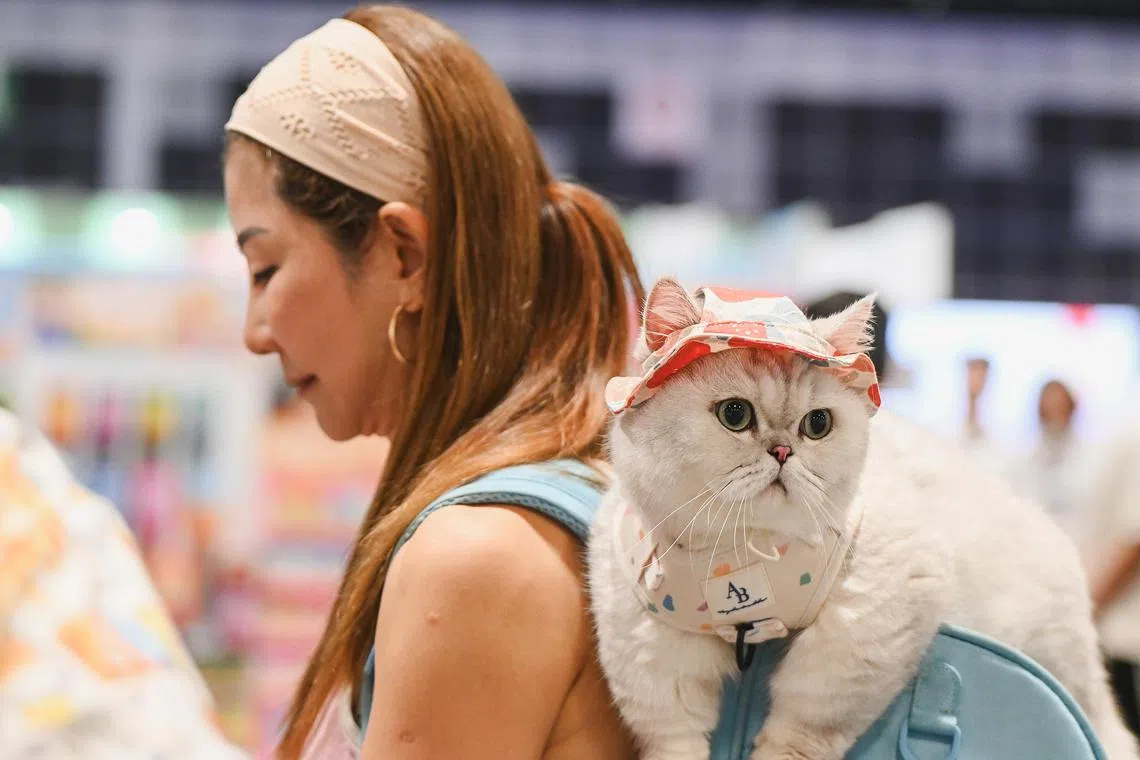
2024 was a year of feline frenzy, according to cat lovers, event organisers, and film enthusiasts.
PHOTO: FURFLR
Follow topic:
SINGAPORE – Although the cat does not have a place in the Chinese Zodiac – something often attributed in folklore to trickery by the rat – 2024 has shaped up to be a year of feline frenzy.
Beyond Singaporeans’ love of hawker fare and complaining, few things unite people here more than their affection for community cats
Designer Clara Koh, who co-wrote the book Habitcat, observes: “We feel that community cats ‘soften’ our hard urban environment. They are harmless creatures that mind their own business. In a way, they are living very harmoniously with humans.”
Habitcat, published in 2014, is based on seven days of tracing the journey of community cats on foot, and explores the relationship between urban dwellers and Singapore’s community cats. It was showcased at the Venice Architecture Biennale in 2021.
“You may not notice their existence or perhaps take their presence for granted,” says Ms Koh. “But after moving to a new BTO neighbourhood without community cats for almost a decade now, we feel that we are somehow missing something.”
It is fitting then that 2024 also saw the launch of the National Parks Board’s (NParks) new Cat Management Framework
Elsewhere, cats have played a role in important cultural moments – as mascots, in big screen appearances and even an unusual mention in the recent United States presidential election.
From the furore over “childless cat ladies” to the rise of AI-generated cat slop, here are six reasons 2024 was the year of the cat.
1. Felines make their mark on fiction
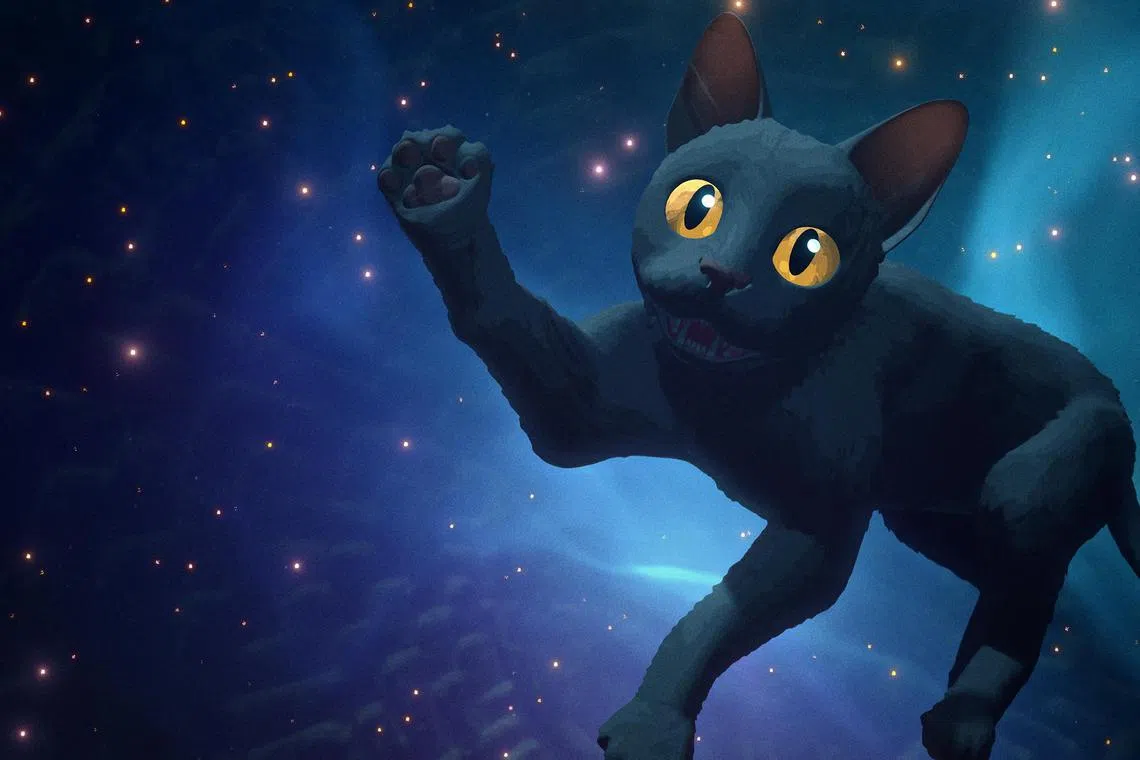
Flow is an animated fantasy adventure film with no dialogue and features a cat making its way through a flooded apocalyptic world.
PHOTO: LHP
The year saw a series of high-profile kitty appearances on the big screen and bookstore bestsellers – from the spy thriller Argylle to the Japanese bestseller The Full Moon Coffee Shop by Mai Mochizuki, inspired by myths of cats returning favours to those who show them affection.
Other cosy reads with cats on The Straits Times’ weekly bestsellers lists include The Chibineko Kitchen by Yuta Takahashi and We’ll Prescribe You A Cat by Syou Ishida.
Notably, a cat plays a central role in A Quiet Place: Day One, carried by Mexico-born actress Lupita Nyong’o as she desperately avoids alien creatures that hunt down even the smallest of noises.
This sparked a viral trend on TikTok, in which cat owners carried their pets while simulating frantic escapes, testing whether their cats could remain silent or inadvertently doom them.
Another film with a standout leading feline is the critically acclaimed Latvian animated adventure film Flow
Critics have praised its use of visual and non-verbal cues to create a story that transcends cultural and linguistic barriers – much like how cats are loved the world over.
In Singapore, the film premiered at independent cinema The Projector on Dec 5.
Ms Worms Virk, The Projector’s marketing manager, says: “Flow has been electrifying the festival circuit, gracing the likes of Cannes Film Festival and Annecy International Animated Film Festival. Now, our local audiences will get to witness its innovative animation and timeless cat-centric story.”
“Fun fact: All the ‘voice acting’ in the film is done by real animals,” she adds.
2. Cat ownership legalised
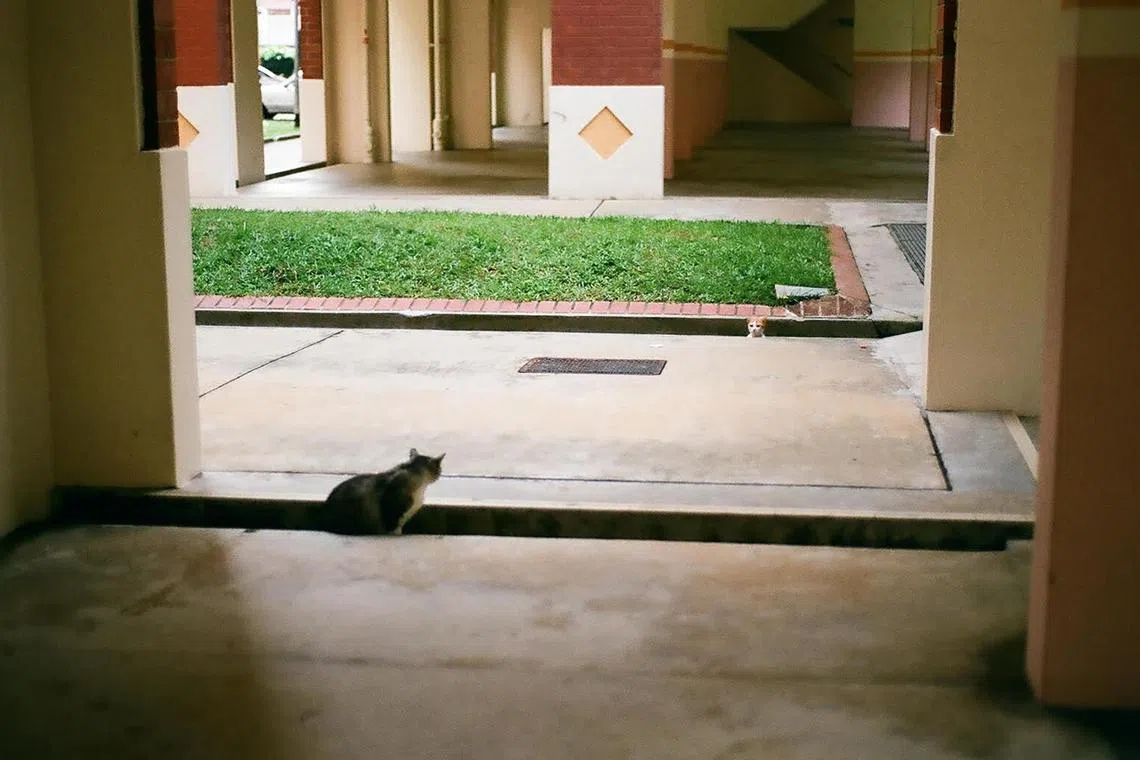
Singapore’s community cats are felines who live outdoors and have no owner.
PHOTO: CLARA KOH AND ALVIN HO
In September, Singapore launched the new Cat Management Framework, making it mandatory for all pet cats to be microchipped and licensed by the end of the two-year transition period in August 2026.
The move lifts a 34-year ban on cat ownership in HDB flats.
Ms Shelby Doshi, a cat behavioural consultant, says the framework is an important step forward for cats in Singapore: “It’s a triumph for animal welfare, as we have been advocating for years to legalise cat ownership.”
A photographer who goes by the name Nguan, with nearly 300,000 followers on Instagram, has spent the past 12 years documenting Singapore’s community cats. He believes the lifting of the ban marks a fitting conclusion to his long-running project.
His photo series has drawn tens of thousands of “likes” on Instagram. “I’d love to think that it’s all to do with my photography, but the truth is that people just love cats.”
Many of his photos depict cats in housing estates that no longer exist. “Community cats belong to no one and everyone. They have become such a distinctive part of our local landscape,” he adds.
Dr Anna Wong, group director of the NParks’ Animal & Veterinary Service (AVS), says some veterinary clinics have voluntarily started their own initiatives to offer discounted microchipping and sterilisation services for pet cats.
These efforts complement the AVS’ work to support low-income households with free pet cat sterilisation and microchipping through the Pet Cat Sterilisation Support programme.
“We strongly encourage cat owners to sterilise their cats before licensing them,” she adds. “Sterilising their cats will not only prevent unintended breeding, but also offers health benefits. Sterilised cats will have a reduced risk of certain cancers, and are less likely to roam and caterwaul.”
However, some cat lovers say the new framework does not go far enough.
Ms Thenuga Vijakumar, president of the Cat Welfare Society, says that a lack of mandatory sterilisation remains a big issue. “The impact is that there will continue to be people with overpopulated homes, abandoning their animals or passing the burden of care to someone else.”
The Cat Welfare Society raised $1.2 million in 2023 towards its initiatives to offer free sterilisation, microchipping and support to lower-income households with cats – a substantial sum necessary due to the many cats in need in Singapore.
“One thing that people constantly fail to acknowledge is that animal welfare issues are a symptom of social welfare issues. We see a number of situations where these animals just happen to be non-human dependents, but they have no assistance.”
Meanwhile, Temasek Polytechnic student Alessandro Lange, 26, who volunteers with the local non-profit Trap Neuter Return project, is concerned about the cat abandonments he has seen while volunteering due to misinformation.
While the new framework allows cat owners to have up to two cats if they live in an HDB flat, there is an exception for those who license their cats in the transition period leading up to 2026, who are allowed to keep all their existing cats if they can ensure their welfare.
Mr Lange hopes that more can be done to raise awareness of this, as well as resources available for low-cost sterilisation or free sterilisation for Community Health Assist Scheme (Chas) cardholders.
3. Cat-inspired establishments rise up
Singapore is no stranger to cat cafes, but some establishments are taking feline appreciation in new directions.
One such establishment is the secretive speakeasy Cat Bite Club in Duxton Road, which one might recognise by the discrete symbol of a grinning cat by its entrance.
The bar has made a remarkable ascent to 54th place in the World’s Best Bars list for 2024, just a year after it opened in 2023.
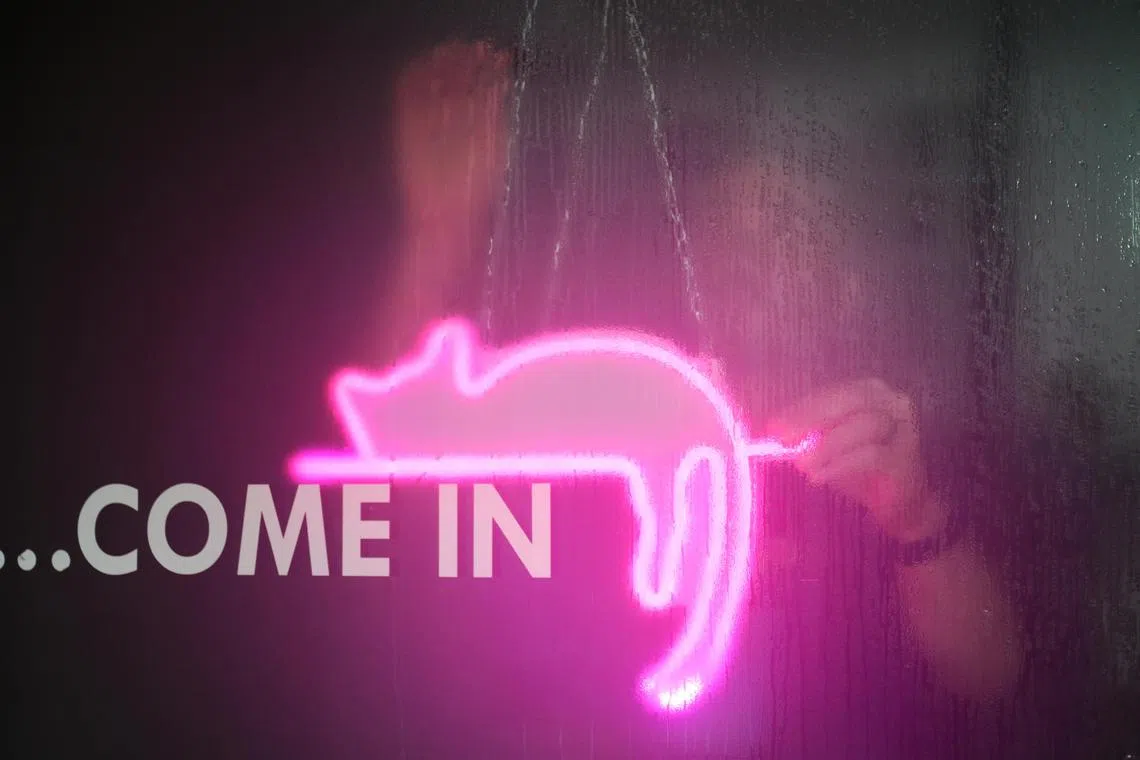
Cat Bite Club founder Jesse Vida switching on the signboard at his bar in Duxton Road.
ST PHOTO: AZMI ATHNI
“Our cat is our mascot,” says co-founder Jesse Vida, 37, who adds that the bar’s name is also inspired by Alice In Wonderland’s Cheshire Cat. “Although there are no other Alice In Wonderland tropes to our bar, that was the original inspiration – that kind of naughty, playful, mysterious energy.
“Those are the vibes we want people to feel and embody when they’re in our space.”
Another cat-themed establishment, Fuzzies, opened in May in Arab Street and offers an unusual twist on the co-working space concept: kitty co-workers.
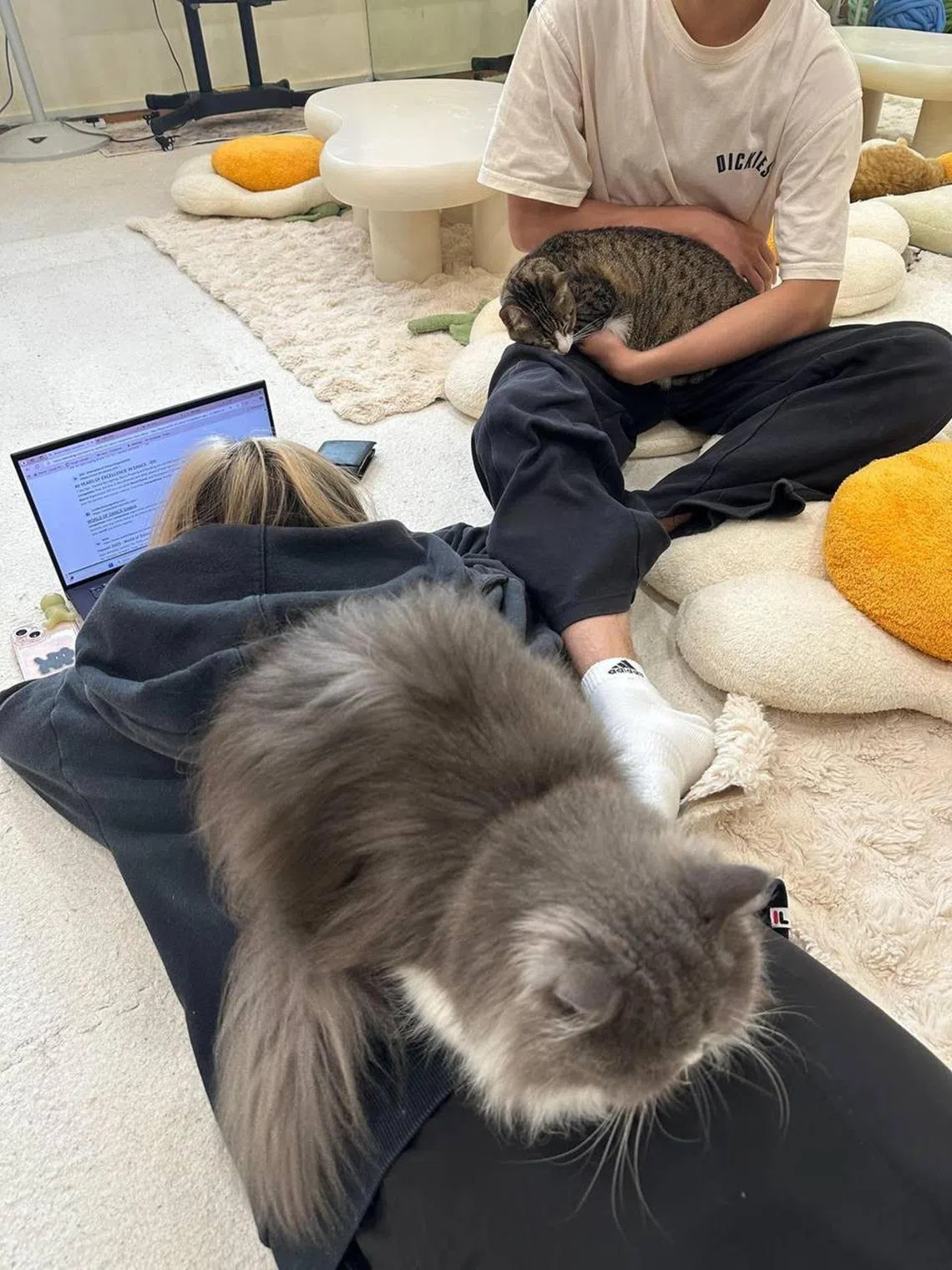
Fuzzies is a cat co-working space in Arab Street co-founded by Mr Lim Khai Chong and Ms Lynn Loh.
PHOTO: FUZZIES
Mr Lim Khai Chong, 30, who co-founded the space with Ms Lynn Loh, 27, says: “Unlike many cat cafes, our cats came before Fuzzies was founded. Lynn and I adopted a number of cats at various times – the cats at Fuzzies are all our pets to begin with.”
As there was not enough space in their home to house all their kitties, they decided to create Fuzzies as another living space for them. “This has informed our design of Fuzzies, with the cats as the priority.”
There are cat-exclusive spaces in Fuzzies which guests cannot enter, so the kitties have a safe space to escape to. Guests are not allowed to feed the cats to avoid them overeating and to ensure a healthy diet.
“As to why a co-working space – if you had the opportunity to work at home with your kitties, you will understand,” says Mr Lim. “The unexpected interruptions, the sudden jumps onto your keyboard – all these little actions make your work day just a little less dreary.”
4. “Childless cat ladies” sparks furore
In 2021, American Senator J.D. Vance labelled some politicians as “a bunch of childless cat ladies who are miserable at their own lives and the choices that they’ve made, and so they want to make the rest of the country miserable too”.
“It’s just a basic fact – you look at Kamala Harris, Pete Buttigieg, AOC – the entire future of the Democrats is controlled by people without children,” says Mr Vance, who is now the Vice-President-elect, referring to the US Vice-President and Transportation Secretary as well as Congresswoman Alexandria Ocasio-Cortez respectively. “And how does it make any sense that we’ve turned our country over to people who don’t really have a direct stake in it?”
When these comments resurfaced in July during the US presidential election, it was claws out from celebrities and politicians alike
The latter, a proud cat owner, later endorsed presidential candidate Harris on Instagram in a post signed, “Taylor Swift, Childless Cat Lady.”
Cat behavioural consultant Ms Doshi believes this tension between parents and “pawrents” stems from a growing section of society who has chosen not to conform to traditional norms to settle down and have children.
Herself a childless cat lady, she says: “We will do anything for our cats. Is that bad? If you can afford it and it makes you happy, why not?”
5. Banner year for cat-themed events
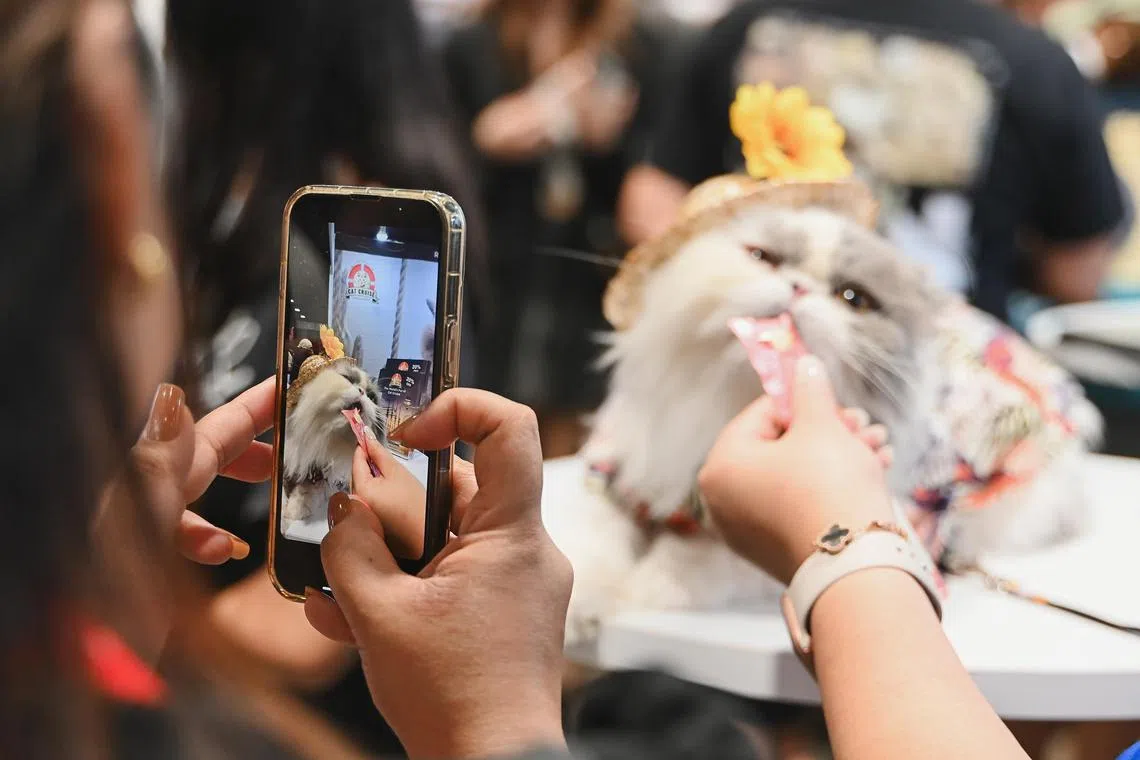
The Asia Cat Expo welcomed over 20,000 participants in 2024 - with a line-up that included competitions, welfare talks and workshops.
PHOTO: FURFLR
The second edition of the Asia Cat Expo was held in 2024, which organisers Furflr say welcomed more than 20,000 attendees. Furflr also previously organised Purrsa Malam, Singapore’s first cat-themed night market, in August, and is holding the next Singapore Cat Festival on Dec 7 and 8 at Singapore Expo.
A Furflr spokesperson says: “The reception for Asia Cat Expo has been incredible. For the first edition last year, we were pleasantly surprised by the overwhelming turnout, with long queues that caught us off guard.”
This meant having to expand the venue for the 2024 edition by moving it to the Suntec Singapore Convention & Exhibition Centre.
“We’ve been organising activities for cats and cat lovers since 2018,” says the spokesperson. “Over the years, we’ve noticed a growing interest and, by 2024, the cat community has become quite established.”
Dr Tay Woo Chiao, who describes himself as an “obsessive cat daddy”, attended the Asia Cat Expo with his kittens Cottons and Cushions. The 37-year-old doctor says a highlight of the event was being able to give his cats a taste test of treat samples before committing to a purchase.
“Because they are fussy. I have bought huge packets of freeze-dried food before, but they just didn’t want it.”
6. Are AI-generated cats the new Hello Kitty?
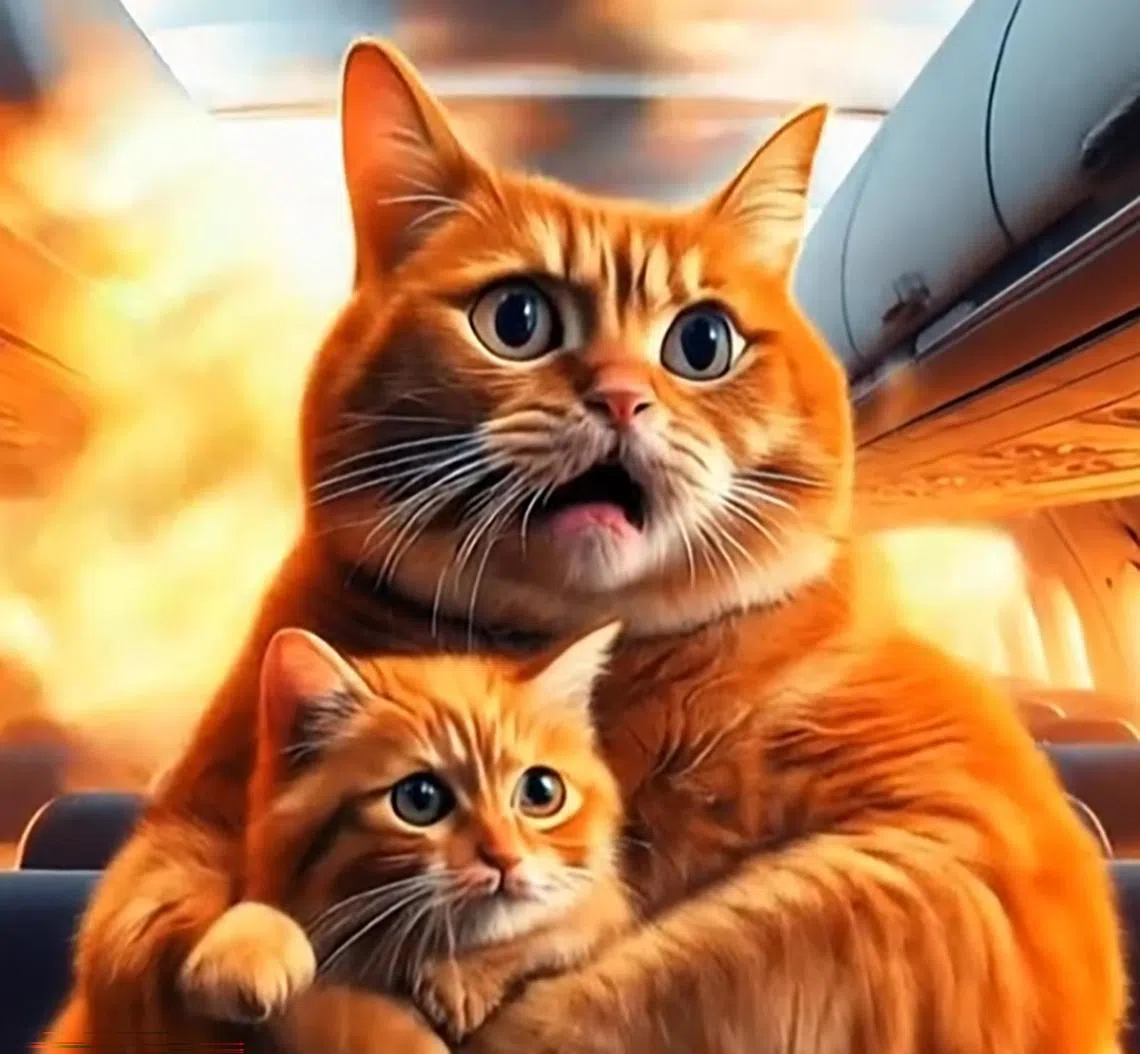
AI-generated cats, often named “Chubby,” are racking up millions of views on TikTok. These videos usually come with captions like “did Chubby manage to survive?”
PHOTO: MPMINDS/TIKTOK
It has also been a big year for cat mascots.
There was the first Doraemon Run in Singapore in November. Doraemon is a Japanese manga-originated blue robotic earless cat, known for pulling otherworldly gadgets out of its pouch.
Cat lover Teng Yu-Ching signed up for the run partly because of its adorable medal design, styled after Doraemon’s iconic bell collar.
The 36-year-old sales manager says: “The run lived up to expectations, though most people there were really there for the theme and the merch.”
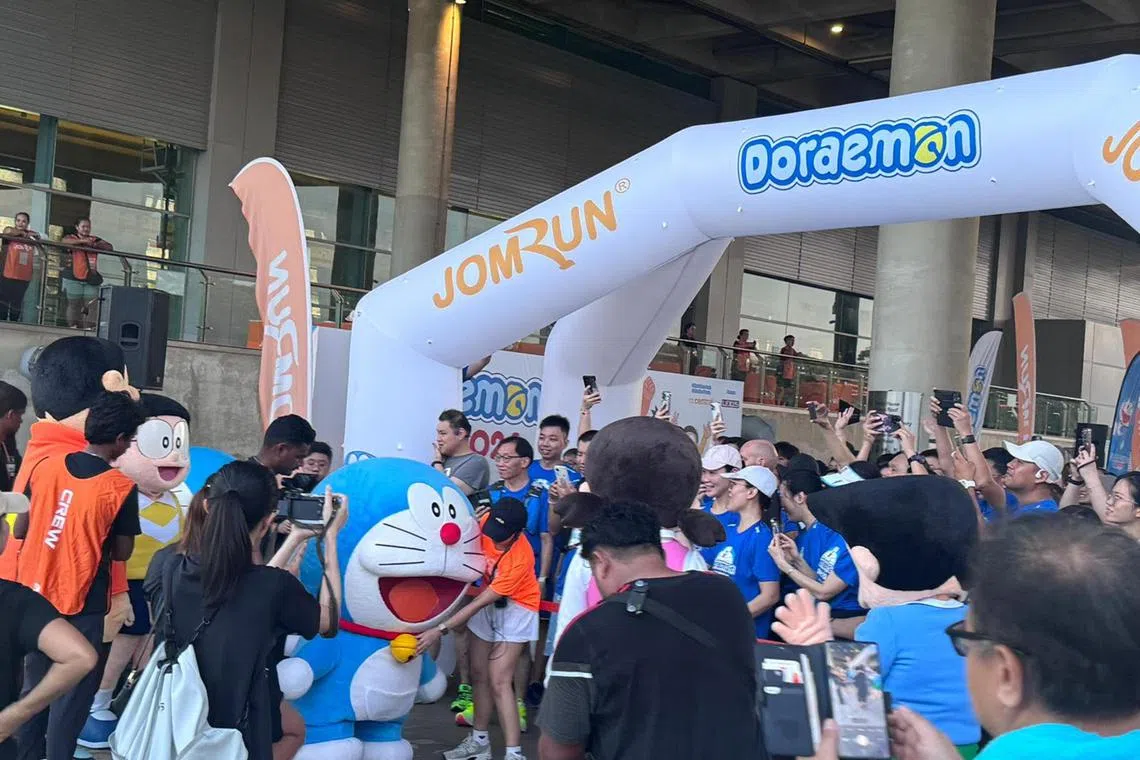
Singapore’s first Doraemon Run took place in November.
PHOTO: TENG YU-CHING
Another cat icon, Hello Kitty, celebrated its 50th birthday
Singapore Cable Car is operating Hello Kitty-themed cabins until the end of 2024.
These days, Hello Kitty is facing fierce competition from the likes of Mofusand – a Japanese group of cats who dresses up in adorable costumes. In October, Uniqlo announced a new Mofusand collaboration for its graphic tees.
But the newest pop culture cat on the scene was not created by human hands. These AI-crafted felines – many of them called “Chubby” – have amassed millions of views on TikTok.
Artificial intelligence researchers note that these cats are part of a phenomenon known as “AI slop” – low-quality content produced rapidly and en masse by AI tools.
With hundreds of accounts now dedicated to sharing stories about cats like Chubby online, it seems that even adorable cat pictures are not beyond AI’s reach.

